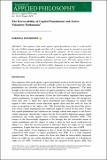Files in this item
The irrevocability of capital punishment and active voluntary euthanasia
Item metadata
| dc.contributor.author | Sudarshan, Saranga | |
| dc.date.accessioned | 2020-10-15T10:30:01Z | |
| dc.date.available | 2020-10-15T10:30:01Z | |
| dc.date.issued | 2020-10-14 | |
| dc.identifier | 270306232 | |
| dc.identifier | 938b527f-6bcf-4022-80fd-36cc21aa1dd3 | |
| dc.identifier | 000577666800001 | |
| dc.identifier | 85092586920 | |
| dc.identifier.citation | Sudarshan , S 2020 , ' The irrevocability of capital punishment and active voluntary euthanasia ' , Journal of Applied Philosophy , vol. Early View . https://doi.org/10.1111/japp.12478 | en |
| dc.identifier.issn | 0264-3758 | |
| dc.identifier.uri | https://hdl.handle.net/10023/20785 | |
| dc.description.abstract | One argument often made against capital punishment is that it would involve the risk of killing innocent people and that such a mistake cannot be corrected in ways that other punishments can. I call this the ‘Irrevocability Argument’. In this article, I argue that the Irrevocability Argument is symmetrical with respect to capital punishment and active voluntary euthanasia. If the Irrevocability Argument works against capital punishment, then it also works against active voluntary euthanasia and vice versa. The main upshot of this is that it means at least some of the moral positions that people hold to treat them differently are untenable. Those who rely on the Irrevocability Argument as an argument against capital punishment are also committed to it as an argument against active voluntary euthanasia. | |
| dc.format.extent | 13 | |
| dc.format.extent | 113531 | |
| dc.language.iso | eng | |
| dc.relation.ispartof | Journal of Applied Philosophy | en |
| dc.subject | B Philosophy (General) | en |
| dc.subject | T-NDAS | en |
| dc.subject.lcc | B1 | en |
| dc.title | The irrevocability of capital punishment and active voluntary euthanasia | en |
| dc.type | Journal article | en |
| dc.contributor.institution | University of St Andrews. Philosophy | en |
| dc.identifier.doi | 10.1111/japp.12478 | |
| dc.description.status | Peer reviewed | en |
This item appears in the following Collection(s)
Items in the St Andrews Research Repository are protected by copyright, with all rights reserved, unless otherwise indicated.

